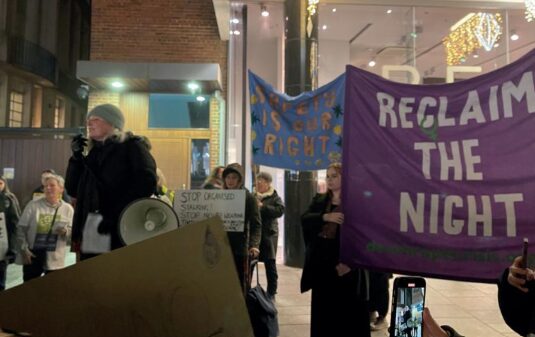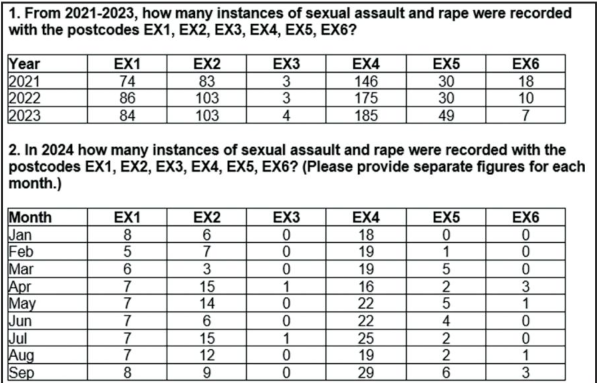
Featured in Print Issue 763
Trigger Warning: This article contains content relating to rape and sexual assault which some readers may find distressing.
Reports of sexual assault and rape have increased across Exeter in 2024 it has been revealed. According to a Freedom of Information (FOI) request obtained by Exeposé, instances of sexual assualt and rape recorded in the postcode EX4 have increased in the past 3 years, rising from 146 in 2021 to 185 in 2023. Reports of sexual assault and rape in 2024 had reached 189 by September — in nine months already surpassing reports across the whole of 2023. This reached a peak in September with 29 reports of sexual assault and rape across the month.
This comes amid rising safety concerns in Exeter, with multiple high-profile case of rape and sexual assault this year. In response, Devon and Cornwall Police have adopted ‘Project NightEye’, which they state aims to “prevent sexual and other crimes by proactively identifying predatory sexual behaviour and intervening to prevent this escalating to an offence”.
In response to a request in the FOI to explain the specific actions undertaken under Project NightEye, Devon and Cornwall Police stated “Project NightEye is intelligence led with information feeding into monthly meetings to discuss and propose tactical actions that may be required within the evening and nighttime economy. It can include the deployment of Project Vigilant trained officers in a specific area.”
Their website further adds that this may include the deployment of plainclothes police officers outside bars or nightclubs. When asked to explain their Body-Worn Camera (BWV) policy with regards to plainclothes officers, the police stated “BWV must be used to record all stop and search encounters by both uniform and plain clothes users, and when in plain clothes, BWV must be activated as soon as the user identifies themselves to the subject as a police officer. Plain clothes users must consider how best to carry and utilise BWV, dependent on their role, to ensure the best protection and transparency for all parties.”

Following these findings, Exeposé approached Exeter students on their experiences of women’s safety in Exeter. Impressions of Exeter as a safe city vary. Several positive insights have been provided, with one student stating that “any incidents are isolated,” and another student commenting that the drunkenness that they [have] witnessed in the city centre “doesn’t affect them much”. One respondent praised systems such as Nightline or Estate Patrol, stating that they would turn to them if they saw any incidents occur.
However, many respondents expressed that they felt they couldn’t take their safety for granted in Exeter. One stated that, as a woman, she has felt that she can “no longer participate in society events” as she feels unsafe walking around when it gets dark after 4pm. Another mentioned frequent catcalling in the city centre and even on Prince of Wales road, which runs through campus.
One respondent shared that a female university student was walking back from the train station at 2pm and she was harassed by a group of men: “Not two days ago I decided to walk home from the train station at around 2pm thinking I’d be fine considering the time of day. Ended up getting chased by a group of guys who eyed me up across the street and saw I was alone. I called someone in a panic while speed walking away while the guys pointed and came after me, commenting on my ass and taunting whether they should go for me or not. No single person or car was around but I managed to make it to a main street where other people were around. Took the cab home from there. Haven’t been able to walk casually around town since. I love walking and listening to podcasts and the fact that I’ll never be able to do this again without a speck of fear in me breaks my heart. THIS city is not safe at all. As a woman I can only go out and about between 8 and 4 as that’s the only time that I can guarantee that it will be light. I can no longer go to the activities I want to, I can no longer participate in society events, as they all show a clear disregard for safety, not offering anyone a safe way home besides the drunken stumble home which I will never ever do as I (and I feel really stupid for saying this seeing as no one else cares about it) care about my safety.”
When asked about examples of antisocial behaviour seen on the streets, a few mentioned unpleasant experiences. Sidwell Street has been identified as the least safe in many responses. One respondent stated that they saw a man riding a motorcycle, waving a machete at them. Additionally, an international student said that they have been shouted at and had things thrown on them due to their background.
Urban Angels has become a forum for sharing stories on similar matters, trying to empower voices of people affected by harassment and violence. Many more experiences can be found there, with safety warnings being shared on the page as well. Additional support can be found in Exeter Safe Space, located at St Stephen’s Church on the High Street, and Devon Rape Crisis.
When asked for comment, a spokesperson for the Students’ Guild said, “the rising cases of sexual assault in Exeter are deeply concerning, and we stand in solidarity with anyone who has felt unsafe or experienced harassment, abuse, or assault. These experiences can leave a lasting impact, and we want to acknowledge the courage it takes to speak out. Your safety is our top priority, and we’re here to listen, support and act.
“We encourage students to report incidents, whether anonymously or openly, through Exeter Speaks Out or seek confidential advice from our Advice Team, who provide support tailored to your individual circumstances. Reporting to the police or the University is entirely your choice, and we’re here to guide you without pressure. By sharing your experiences, you help us not only support you but also advocate for stronger preventative measures to protect others.
“Your elected Student Living Officer, Kira Brookes, is actively working on a range of initiatives, from 16 Days of Activism to misconduct reporting processes, to improve the safety and wellbeing of all students. We are committed to creating a campus where everyone feels secure, valued, and heard.
“We recognise that there’s much more to do — in Exeter, across the UK, and around the world — to end sexual violence. Together, we can create meaningful change and build a safer community for everyone.”
Meanwhile, a spokesperson for the University said, “the safety and security of all students is our highest priority. We work closely with other organisations in the community to ensure Exeter remains a safe city. The University is a key partner in the Community Safety Partnership in Exeter which has received significant funding from the Home Office’s Safer Streets Fund to help enhance night-time safety measures across the city centre, including increased CCTV cameras and lighting in locations where women have reported feeling unsafe, and the Exeter Safe Space in the city centre. Through a previous Safety of Women at Night project, we also launched the Safety Charter that more than 170 businesses across Exeter have signed up to. On campus we have fitted additional lighting and CCTV, and are running bystander intervention and consent training courses.”

